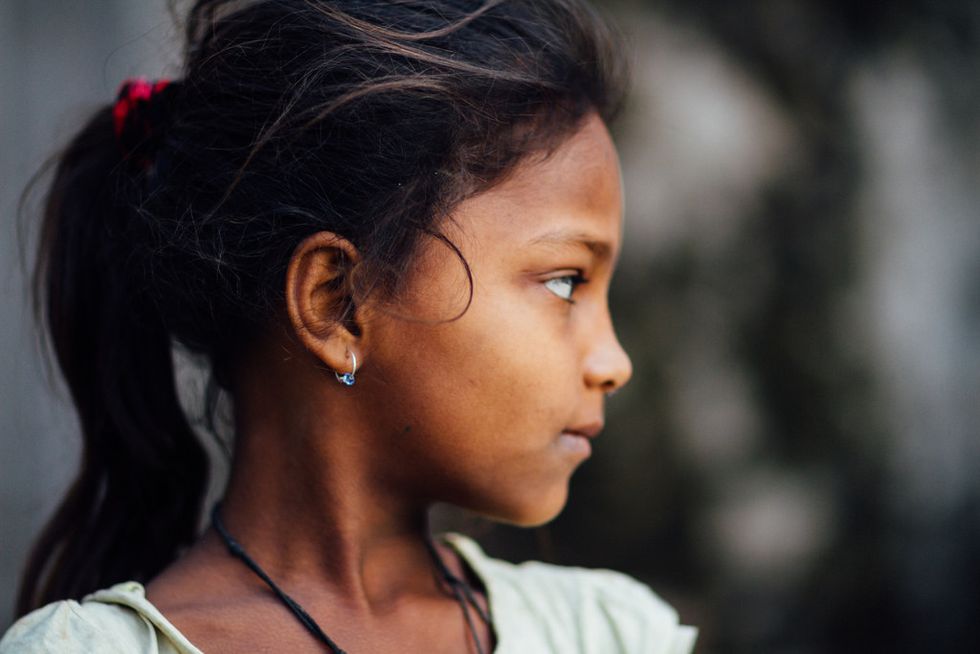I remember my government teacher's astonishment when he learnt of a study that shown African- American girls chose a white colored doll over a darker-skinned doll because the white doll was prettier*. My white male teacher could not believe the world in which a person would rather the color of someone else's skin over their own. However, as a dark-skinned Indian girl, this is my reality. I am constantly judged by an aspect of my life that I cannot control, an aspect that millions of others have wished to change. My 'colored' friends and I turn the racism we face into jokes, using phrases such as 'being white is the dream' and 'the white one always win'. My family has adapted to the hash stares we face in rural areas of Georgia. And though generations have fought a constant battle against this racism, much more has to be done.
As a kid growing up in a white-dominated society, I have always felt like the color of my skin was a burden. And though I would love to blame my childhood in America for the reason of racism, it is not. In India, my country of origin, products are endorsed by celebrities to 'whiten' the face. A lighter and whiter face is a goal many Indians want. Harsh cruelty shown by western democracies has made whole counties want to change the color of their skin. Indian clothes are always modelled by the model with the lightest skin color.
A majority of my childhood memories were made in white- dominated Georgia. I was often on of the few dark- skinned people in my class. In many instances I was the only colored person in many activities. I befriended many Indian- Americans, whether it was because they looked like me, or because we could relate to similar problems that my white friends couldn't understand. The lighter- skinned people in my class seemed to be oblivious to my issues, and to the racist comments they would say. On the topic of racism, my American friends would tell me how I was lucky I was dark- skinned, how I was lucky because no racist person would date me, but they might accidentally date a racist person. How it was a compliment that I was Indian because I was 'smart'. Or, how, when they first saw me, they wondered what language I spoke. My teachers would tell me how they 'know that in Indian culture, parents are protective of their daughters'. Boys always reminded me of how "no offense or anything, but Indians aren't my type". I got used to disgusted faces in elementary school when I would open my lunch box, revealing my Indian food. I started hating my heritage, my culture, how I would have to wear a dot on my forehead that people would stare at. How dark my skin was compared to my friends and classmates. How on any given day, no matter what I ate or what perfume I wore, I was always smelling like curry.
Overtime I adopted the American culture. My family would call me a 'coconut', meaning I had brown skin, but inside I acted white. My Indian friends would tell me how 'white' I was acting. My sister would get mad at me for not knowing my own heritage. Outside of my house, I would not associate to Hindu, or Indian culture, and I was praised for this. I had finally reached the dream my friends and I longed for: being white. Yet, we weren't white. We still had our dark skin, our brown hair, the lingering smell of what white people thought curry smelt like. It was as if, no matter how we acted, no matter how white we were on the inside, it was the outside—how we looked like—that overruled any other factor.
Fortunately, as time progressed, it seemed as if Indian culture was being more 'accepted'. Bindis were worn to Coachella, henna, formerly known as "why is there dog poop on your hand" was on the skin of white people. As my sister relentlessly spoke of equal right and acceptance for Indian culture, I eventually started to agree with her. I started to realize how my culture was nothing to be ashamed about. Surely, as I started sharing more about my Indian roots, the curry jokes from my friends did not subside. But, it allowed me to become more comfortable, and to relate more with peers with the same origins.
Still, I kept my 'whiteness'. But, I didn't want that to compromise my newly found respect for my culture. A part of me felt guilty, as if I were picking and choosing which parts of two worlds I want to participate in. Though, I belonged to both cultures. I was born and raised in America, but was feed the Indian beliefs through my family. I wanted to represent the two worlds that I have always learnt. I will shop at American Eagle, but as soon as I go home, I'll start on my roti and curry, and that was nothing to be ashamed of.
Nevertheless, I still endure prejudice comments from people today. My sister would tell me how disappointed she is in society, who people say racism is getting better, but it will still exist in future generations. I chose not to believe her. However, as time passed, and as nothing changed, I realized she was right. Racism is a thing everyone faces, whether in the form of hate, or white privilege. Some choose to acknowledge it, others may implement it, and some turn a blind eye. But as time goes on, we can only hope that future generations can forget about this nasty tradition, and see through a lens without color.
*See study here: http://www.naacpldf.org/brown-at-60-the-doll-test





 man making a coffee lattePhoto by
man making a coffee lattePhoto by  Photo by
Photo by  Photo by
Photo by  Photo by
Photo by 









 Photo by
Photo by 




